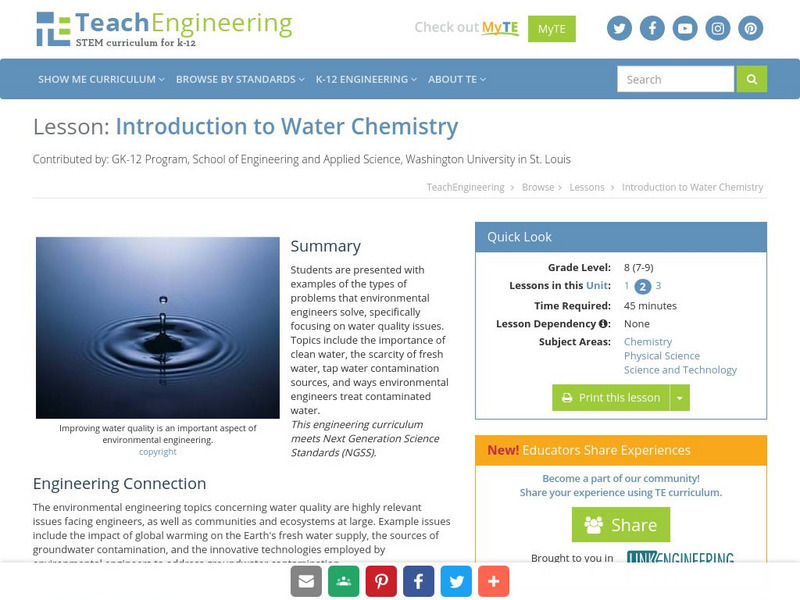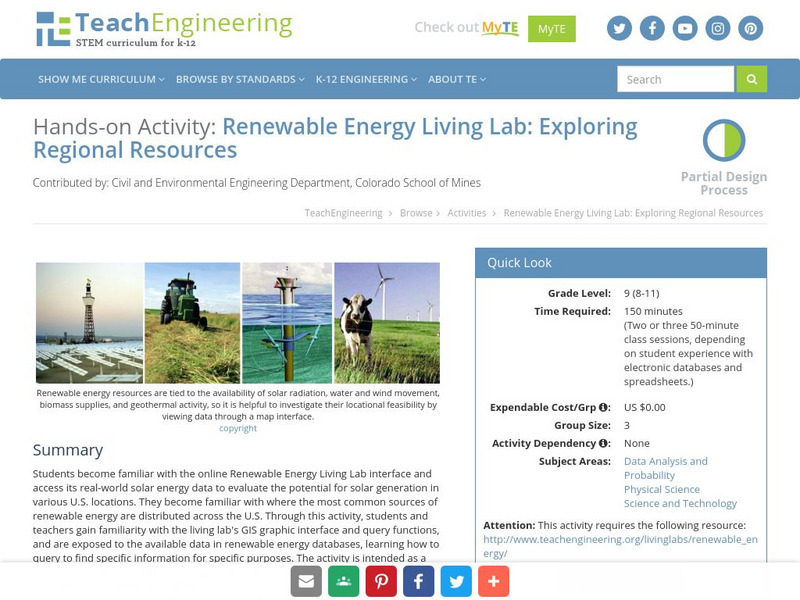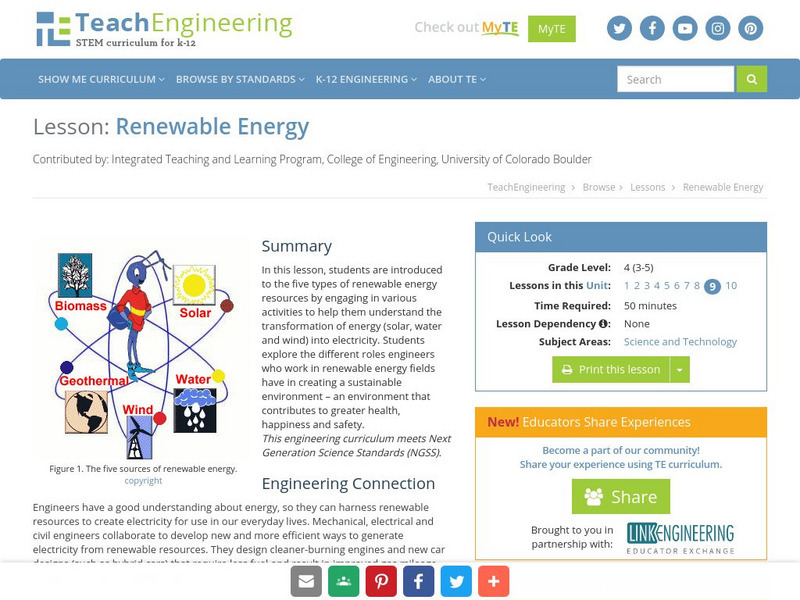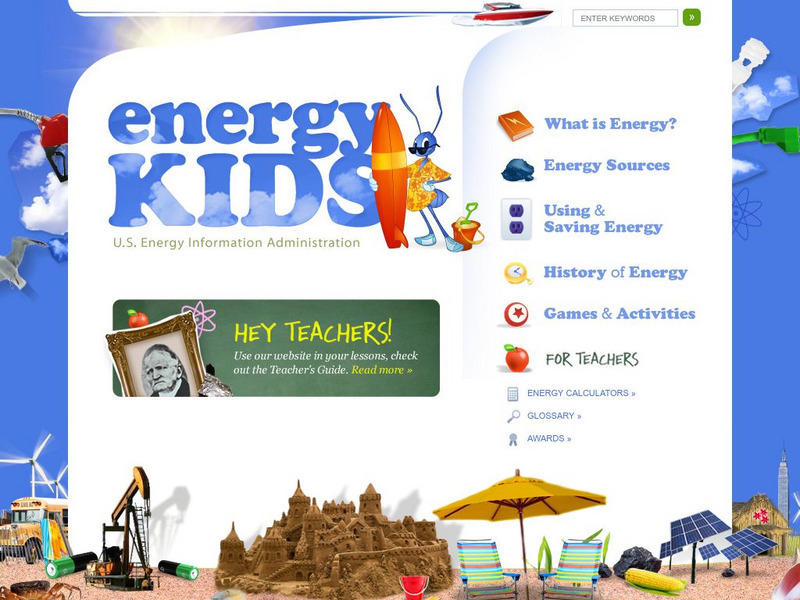Hi, what do you want to do?
Curated OER
Learning From Leaves: A Look at Leaf Size
Students measure and analyze leaves from various environments. They discuss the environments, and make inferences about environmental variables that could have contributed to the differences in leaf size and texture.
Curated OER
Eat Your Flowers
Students grow flowers in different soil mediums to determine the effect on flavor. In this investigative instructional activity students study flowers, plant them and taste them to see how they differ in different potting soils.
Curated OER
Computer Lab Lesson Plan - Science
Students examine rocks and minerals. Using the internet, students research rocks and how they are formed. They use word processing software to list minerals and materials that form specific rocks.
Curated OER
Design Weather Instruments using LEGO Sensors
Students design and create a LEGO structure that will house and protect a temperature sensor. They leave the structure in a safe spot and check the temperature regularly and chart it. After the students have built their structures, the...
Curated OER
What Do Plants Need to Grow?
Fourth graders control variables to determine the effect on plant growth. They collect information by observing and measuring and construct simple graphs, tables, maps and charts to organize, examine and evaluate information.
TeachEngineering
Teach Engineering: All About Water!
Students learn about the differences between types of water (surface and ground), as well as the differences between streams, rivers and lakes. Then, they learn about dissolved organic matter (DOM), and the role it plays in identifying...
US Department of Energy
U.s. Department of Energy: Water Power Program: Types of Hydropower Plants
Learn about the three types of hydroelectric power plants used to capture the energy from water at a hydropower dam site.
Missouri Botanical Garden
Missouri Botanical Garden: Water Pollution
Water pollution occurs when a body of water is adversely affected due to the addition of large amounts of materials to the water. The sources of water pollution are categorized as being a point source or a non-source point of pollution....
TeachEngineering
Teach Engineering: Introduction to Water Chemistry
Students are presented with examples of the types of problems that environmental engineers solve, specifically focusing on water quality issues. Topics include the importance of clean water, the scarcity of fresh water, tap water...
HotChalk
Hot Chalk: Lesson Plans Page: Causes of Pollution
This lesson plan is designed to teach young children identify the types of pollution, the sources of the pollution, and how they can protect the environment from further pollutants.
TeachEngineering
Teach Engineering: Water, Water Everywhere
Students learn about floods, discovering that different types of floods occur from different water sources, but primarily from heavy rainfall. While floods occur naturally and have benefits such as creating fertile farmland, students...
TeachEngineering
Teach Engineering: Energy
Through nine lessons, students are introduced to a range of energy types--electrical, light, sound and thermal-as well as the renewable energy sources of wind, hydro (water) and solar power. Subjects range from understanding that the...
PBS
Nh Pbs: Nature Works: Rivers and Streams
Learn more about Rivers and Streams through this educational resource. This site features photographs, a description, fun facts, and more about this type of freshwater ecosystem.
TeachEngineering
Teach Engineering: Engineering for the Earth
Young students are introduced to the complex systems of the Earth through numerous lessons on its natural resources, processes, weather, climate and landforms. Key earth science topics include rocks, soils and minerals, water and natural...
TeachEngineering
Teach Engineering: Renewable Energy Living Lab
Students become familiar with the online Renewable Energy Living Lab interface and access its real-world solar energy data to evaluate the potential for solar generation in various U.S. locations. They become familiar with where the most...
Other
Groundwater in Idaho: Aquifers
This resource outlines what an aquifer is, the types of aquifers, and aquifer categorization. It also provides additional information for further study.
TeachEngineering
Teach Engineering: Renewable Energy
In this instructional activity, students are introduced to the types of renewable energy resources. They are involved in activities to help them understand the transformation of energy (solar, water and wind) into electricity. Students...
Other
Weather Photography
Source of information on the subject of weather photography. There are great links, images and tips on equipment to use. For the intermediate to advanced photographer.
TeachEngineering
Teach Engineering: Air Pollution
Students are introduced to the concept of air quality by investigating the composition, properties, atmospheric layers and everyday importance of air. They explore the sources and effects of visible and invisible air pollution. By...
TeachEngineering
Teach Engineering: Introduction to Environmental Engineering
Learners are presented with examples of the types of problems that environmental engineers solve, specifically focusing on air and land quality issues. Air quality topics include air pollution sources, results of poor air quality...
US Energy Information Administration
U.s. Eia Energy Kids
This extensive resource provides information on renewable energy, nonrenewable energy and energy conservation.

























